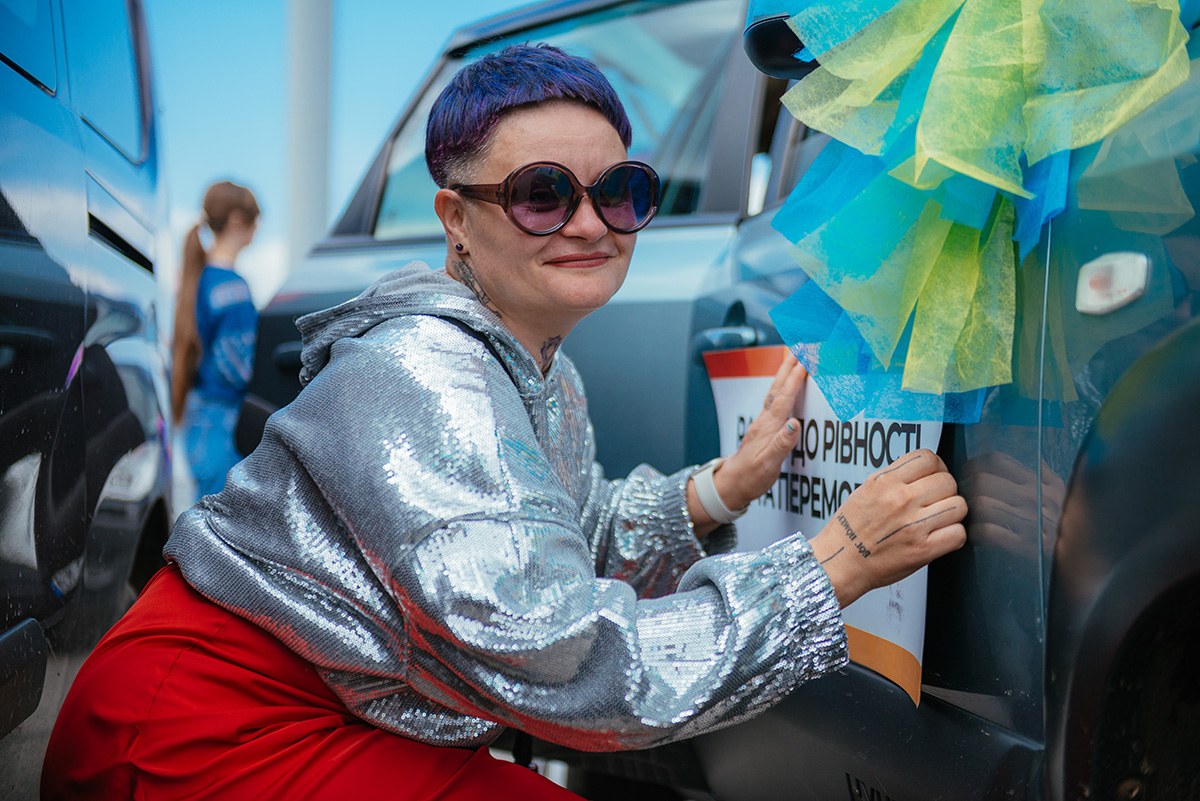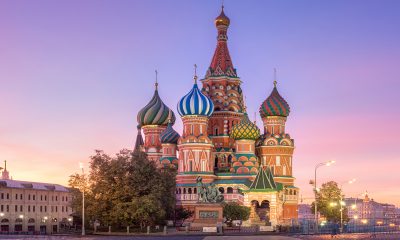Ukraine
Kidnapped LGBTQ Ukrainian children must not be forgotten
Trump to meet with Russian President Vladimir Putin in Alaska on Friday
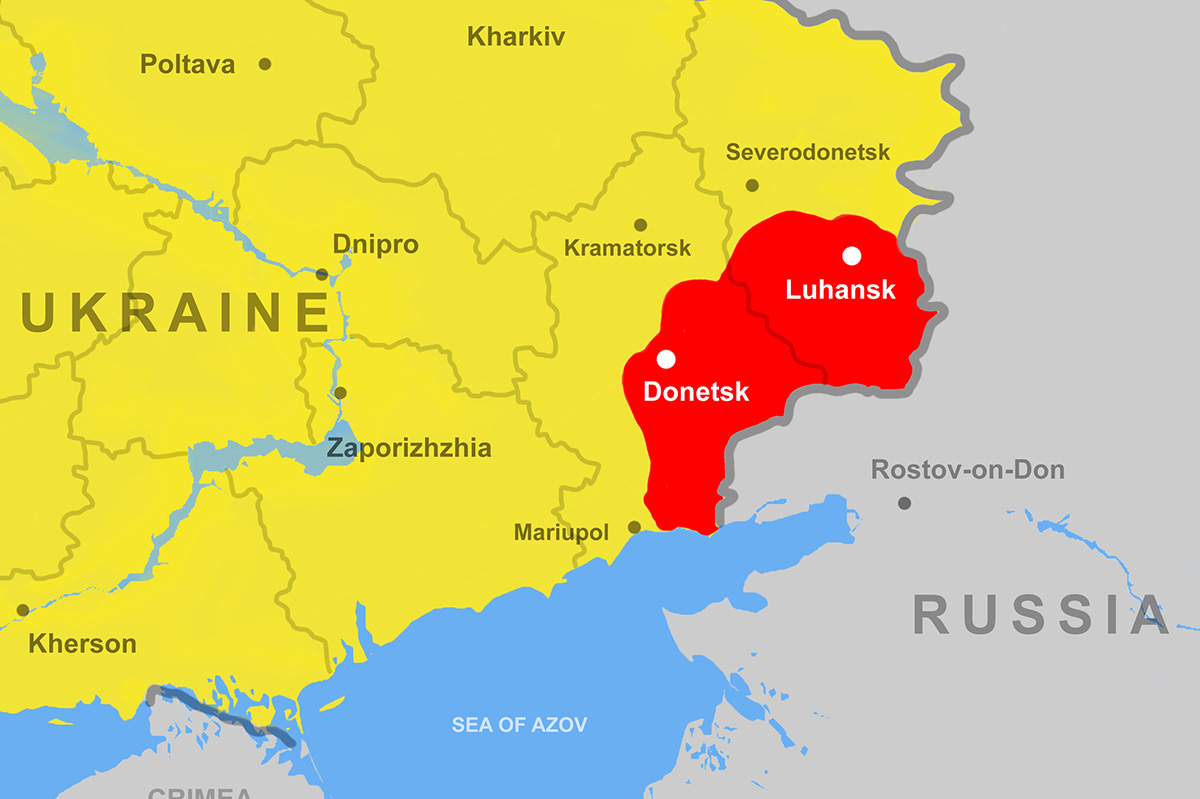
This is a decisive moment for Ukraine.
Tens of thousands of Ukrainian children have been torn from their families and forcibly taken to Russia or Russian-occupied territories, where they are given away for adoption to pro-Putin families. While the Parliamentary Assembly of the Council of Europe has declared this a form of genocide, the Trump administration is trying to pressure Ukrainian President Zelensky into accepting a peace deal that sacrifices Ukraine’s interests. In the process, it seemed like the fate of kidnapped Ukrainian children was being ignored. The Yale University program that played an important role in tracking abducted children was cut off by the current U.S. administration, along with many other humanitarian initiatives.
Meanwhile, Russia has created a special “adoption” website where children are advertised like possessions for prospective “parents.” The site lists their temperament (“obedient” and “calm”), their appearance (so racist adopters won’t get a Black or Jewish child), their eye color. But what is missing is any mention of the child’s personality, their unwillingness to leave their home, or the fact that some of these children are almost certainly LGBTQ, simply based on statistical probability.
The treatment these children face raises serious concerns, especially for LGBTQ children and teenagers taken from more queer-friendly Ukraine into a country where LGBTQ people are actively persecuted. The Washington Blade spoke with people from Ukraine to better understand the situation, and it turned out to be far more complex, involving not only occupation forces but also family abuse and ideological brainwashing.
The Blade spoke with Rachael, a transgender woman currently living in the Russian-occupied Donbas region.
In Russia, transitioning for trans people is now completely prohibited, regardless of age — raising additional concerns for the fate of trans youth. Some children and teenagers from Donbas have been sent to Russia, while minors from other Ukrainian territories have also been sent to occupied Donbas.
Rachael began by explaining the kind of people who now control the region.
“During my childhood, I was a gender-nonconforming child and had various neuropsychological conditions,” she told the Blade. “I was subjected to sexual harassment by male classmates. On one occasion, older students attempted to force me into a basement. Luckily, I was able to break free and escape. Once I was hiding in a manhole — not an active sewer, but a bunker-like space with an entrance resembling a hatch. A group of boys found me and threatened to pee on me. I grabbed a big stick, and they ran off, scared they’d hurt their genitals. Most of them were typical Donetsk street thugs (“gopota”), and later they joined the so-called People’s Militia of Donbas. Almost all of the Donbas militia is made up of people like them.”
The militia is effectively the local police. Naturally, queer children cannot expect protection from them if their “adoptive” families abuse them.
But, as Rachael explained, the threat does not come only from adoptive families. Biological transphobic and queerphobic parents can also use the situation to their advantage, since Ukrainian law prohibits queerphobic abuse.
“There is a huge probability that some transphobic and homophobic parents deliberately send their kids to Russia,” Rachael told the Blade. “It became part of a conversion therapy. I mean, I know a case when parents pumped a trans child with neuroleptics to make them almost incapacitated, causing serious problems, but supposedly ‘curing’ their queerness. Now those parents have another ‘option’ — they can send kids to ‘patriotic programs’ in Russia, so the kids will be “disciplined” and “cured.” They don’t care that those kids are more likely to be sent to the front lines to fight other Ukrainians a few years later.”
And this is perhaps the most chilling fact — something many human rights groups overlook: some Ukrainian parents, already brainwashed by Russian propaganda before the war, would truly rather see their child dead than queer. The war simply “legalized” that choice for them.
“Of course, there are conservative, anti-LGBT tendencies all around the world, including in Western Ukraine,” she said. “But in the east, Russian propaganda is very strong: before the war, when I was a teenager, I supported Russia. If I had been taken back then, I would have supported Russian programs, despite the abuse from pro-Russian thugs.”
Some LGBTQ people in Donbas continue to support Russia even now, after the country officially recognized the “LGBT movement” as extremist and completely prohibited gender transition.
“Those queers think that Russia is stronger than Ukraine, so it’s better to be on the Russian side, despite rape and queerphobic abuse in the Russian army. Some queer boys think they’ll become the next Harvey Milk for Russia, because Harvey Milk served in the U.S. Navy during the Korean War,” said Rachael. “They imagine themselves not just as bohemian queers, but as fighters for Russia. They think they’ll earn their place in the new country.”
In reality, they are often subjected to violence from fellow soldiers and used as cannon fodder — usually killed in the first assaults. But they don’t see the truth behind the “nice picture.”
“It’s not just about fear. They genuinely try to believe in Russia — just like many Muslim youth who joined ISIS were brainwashed into believing they were going to a better life, even though they were used as cannon fodder. Those Muslim youth believed in ‘global Islamic ideas’; those in Donbas believed in a ‘global Russian world.’ It’s essentially the same problem,” said Rachael.
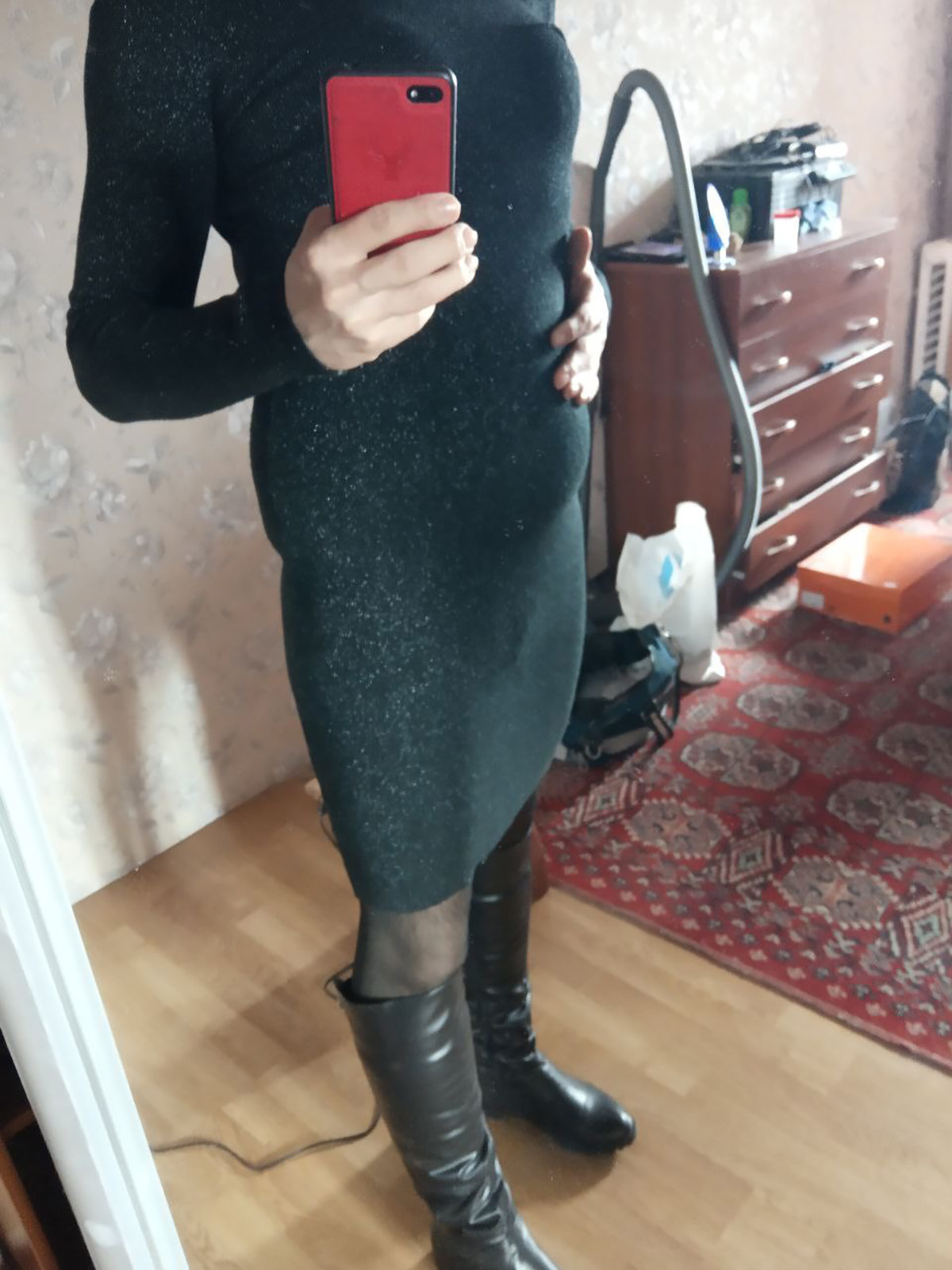
Propaganda is one of the most powerful weapons in this war. This is why it is crucial to rescue young Ukrainian children from it, and why queer Ukrainian children need to be found before they learn to hate themselves or are manipulated and exploited.
The Blade also spoke with a Ukrainian lawyer and LGBTQ ally, who preferred to remain anonymous, about the legal aspects of the situation.
“As a Ukrainian lawyer, I must emphasize that the forced transfer and ‘adoption’ of Ukrainian LGBT — especially transgender — children to Russia is both unlawful and uniquely dangerous,” he told the Blade. “Beyond breaching international humanitarian law and the Convention on the Rights of the Child, these minors are placed in a system that criminalizes LGBT visibility and labels the ‘LGBT movement’ as extremist, enabling surveillance, harassment, and coercive ‘correction.’”
The rights of trans children raise specific concerns.
“For trans teenagers, legal gender recognition and gender-affirming care are effectively banned, so misgendering, denial of appropriate healthcare, and exposure to conversion practices are foreseeable — and harmful — outcomes,” the lawyer continued. “In any negotiations, the only rights-compliant baseline is rapid family tracing, safe return to Ukraine, and independent monitoring to guarantee these children can live safely and be themselves.”
Failing to act now could mean allowing an entire generation to be erased.

Ukraine
Meet the gay couple fighting for marriage rights in Ukraine
Activists claim U.S. Christian groups are financing attacks on equality

(Editor’s note: The International Women’s Media Foundation’s Women on the Ground: Reporting from Ukraine’s Unseen Frontlines Initiative in partnership with the Howard G. Buffett Foundation funded this reporting.)
Thirty-one-year-old Timur Levchuk was hurrying downstairs, away from the stuffy courtroom, packed with reporters, members of far-right groups and LGBTQ activists. The court hearing sounded like a duel between ideologies. The word “family” was the target — his family. Levchuk’s opponents from the conservative group Vsi Razom or All Together, initiated the court hearing to dissolve his marriage. He was trying to hold back his emotions.
The war has been breathing death, ruining lives across his country for nearly four years. At any moment, a missile or drone could hit his home. Under martial law, the border was closed for men of Levchuk’s age. He had not been able to move together with his partner, a Ukrainian diplomat, Zoryan Kis, who is posted on a mission abroad. Almost every night, he awakes to air alerts, to Russia’s attacks. And now aggressive right-wing activists were attacking his marriage, his right to be happy, to have a future.
As soon as Levchuk stepped outside, he saw a crowd of his friends from the LGBTQ community cheering and jumping with joy, holding colorful banners in their hands: “Our family is real!” and “Family is above the stereotypes!” Overwhelmed with emotions, Levchuk broke into tears. His partner of 13 years, Kis, quickly walked up to him. They hugged, as their friends cheered the first legal gay marriage victory in Ukraine.
Levchuk’s face was wet, he was crying. The partners see one another just twice a year; but this fight for their official marriage went on and on, it meant a chance to live together.
“Zorian had to travel from Israel for this hearing today, for just one day, and half of our day was stolen from us by this conservative group, which acts just like Russian homophobes,” Kis told the Washington Blade.
Tears continued to run down his face.
“We hear that our opponents from Vsi Razom, the group fighting the court decision recognizing our marriage, is supported by the U.S. fundamental Christian groups. This is shocking. We are attacked on the money from what used to be the world’s best democracy,” Levchuk told the Blade.
A group of right-wing supporters waited by the entrance to the court, too, with a few policemen in between, watching out for any signs of violence, in a country with enough of it already.
“This decision, this process of legalizing my marriage took me so much time, so much effort,” Levchuk continued. “I knew it would be painful. Our opponents, Vsi Razom activists and their leader, Ruslan Kukharchuk, claim they feel offended by the court decision. But it is our feelings and our rights that are being hurt.”
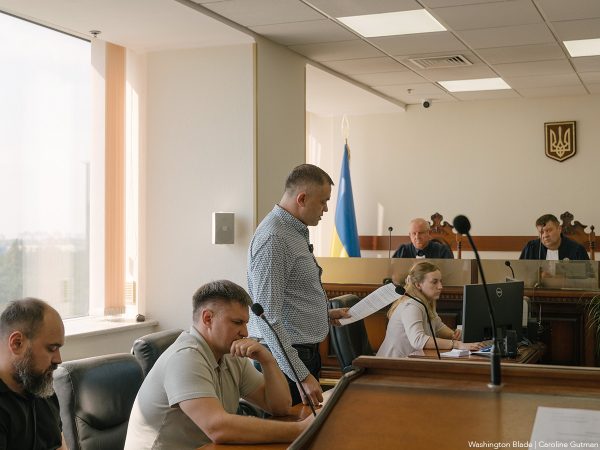
The appealing side, a middle-aged man, Kukharchuk, has been fighting against LGBTQ for more than 20 years. On Sept. 21, 2003, Kukharchuk and his group, called Love is Against Homosexuals, protested on Kyiv’s central square of Maidan with banners that said “Homosexualism is the enemy of family!” “Single sex love does not exist!”, and “You cannot be born gay, you can become gay.” Kukharchuk has been leading dozens of protests against LGBTQ rights. The Ukrainian Parliament voted for a new law criminalizing any reference to homosexuality in the media or public domain in 2012.
Before the Revolution of Dignity in 2014, the absolute majority of Ukrainians, up to 95 percent, did not support the idea of same-sex marriages, according to a social study conducted by GfK Ukraine, a social and market research group. But the revolution, the war in the east and the Russian invasion of Ukraine has dramatically changed the public view on the rights of minorities. Last year, more than 70 percent of Ukrainians said that LGBTQ people should have the same rights as everybody else, according to a survey by the International Institute of Sociology in Kyiv.
But Kukharchuk has not given up.
A fluent English speaker, he talks as if addressing President Donald Trump, encouraging America, too, to rise against LGBTQ rights.
“The U.S. government should not repeat the same mistake: not having the right actions behind the right beliefs,” he says on the Evangelical Focus, an outlet that describes its mission as “helping build bridges between evangelical churches and all of society.” He continues to trumpet his cause: “Ukraine unlike many European countries is the country where LGBT flags are still not flown on government buildings, where people are not fined for praying.”
Levchuk and Kis are not against Christian believers. They believe in Ukraine’s tolerance and respect for the rights of minorities. It’s been a thorny and long path for the two longtime LGBTQ activists. To test their hometown of Kyiv for homophobia, the two in 2015 on a summer day strolled around the city center, holding each other’s hands. Their friends were filming public reaction to the gay couple’s open walk. It seemed peaceful, at first. Pedestrians stared but did not insult the couple until the two sat down on a bench on the central street of Khreshchatyk. Three men attacked them, kicking Levchuk and Kiss, and spraying them with tear gas. The video of the violent attack went viral.
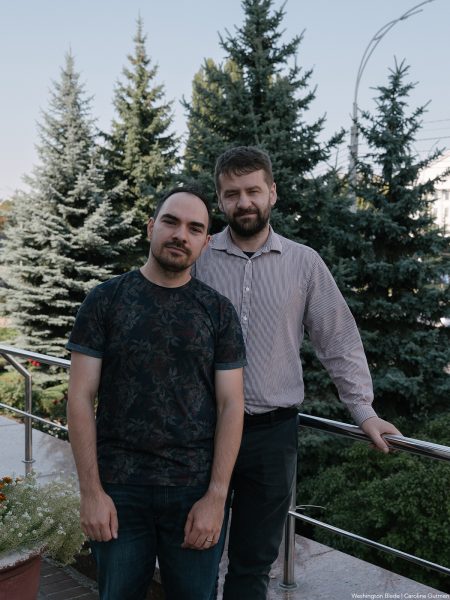
Levchuk and Kis waited for Ukraine to grow more tolerant for years. Kyiv rejected their marriage in 2021, “due to the fact that according to the legislation of Ukraine, the concept of marriage is defined as a family union of a woman and a man.” Last year, Kis was appointed to work in the Ukrainian embassy in Israel; and since all diplomatic families had a right to live together on diplomatic missions, he began to fight in court for his spouse’s right to travel abroad. Men are prohibited from traveling abroad under martial law rules intended to prevent draft dodging. Last year, Kyiv’s court decided to “refuse the proceedings.” But on July 10 this year, Kyiv’s district court recognized the fact of a “one-sex couple of spouses,” giving the couple a legal right to a marriage. That was a first in Ukraine’s history.
That decision was “unacceptable” to Kukharchuk and the Vsi Razom group; they appealed the court decision. When asked what brought him to the Kyiv Court of Appeal on Sept. 10, Kukharchuk said: “We absolutely believe that the Constitution is on our side. It very firmly underlines and emphasizes the definition of marriage — it can only be a union between one man and one woman, so our position in court is very clear.”
To the great joy of all Ukrainian LGBTQ couples, Kyiv’s appeal court confirmed the fact of the two men living in “a family” on Sept. 10. It recognized their marriage. But the victory felt bittersweet. The powers behind their opponents were in the United States, the spouses told the Blade.
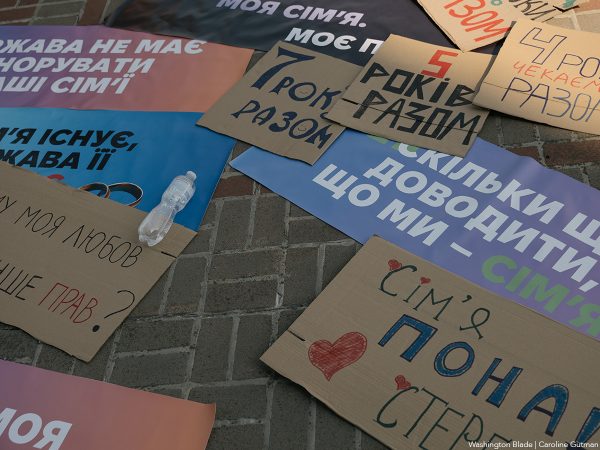
“We hear that our opponents from the conservative Vsi Razom group, receive financing from the Christian groups in the U.S.,” Levchuk told the Blade. “It’s hard to comprehend that our right to be happy is being questioned in the country of the best democracy in the world, the United States.”
But Kukharchuk lost the case, at least this time.
“We realize that our fight is not over. It’s hard and it takes forever. Our opponents will surely take the decision to the Supreme Court now,” Kis told the Blade.
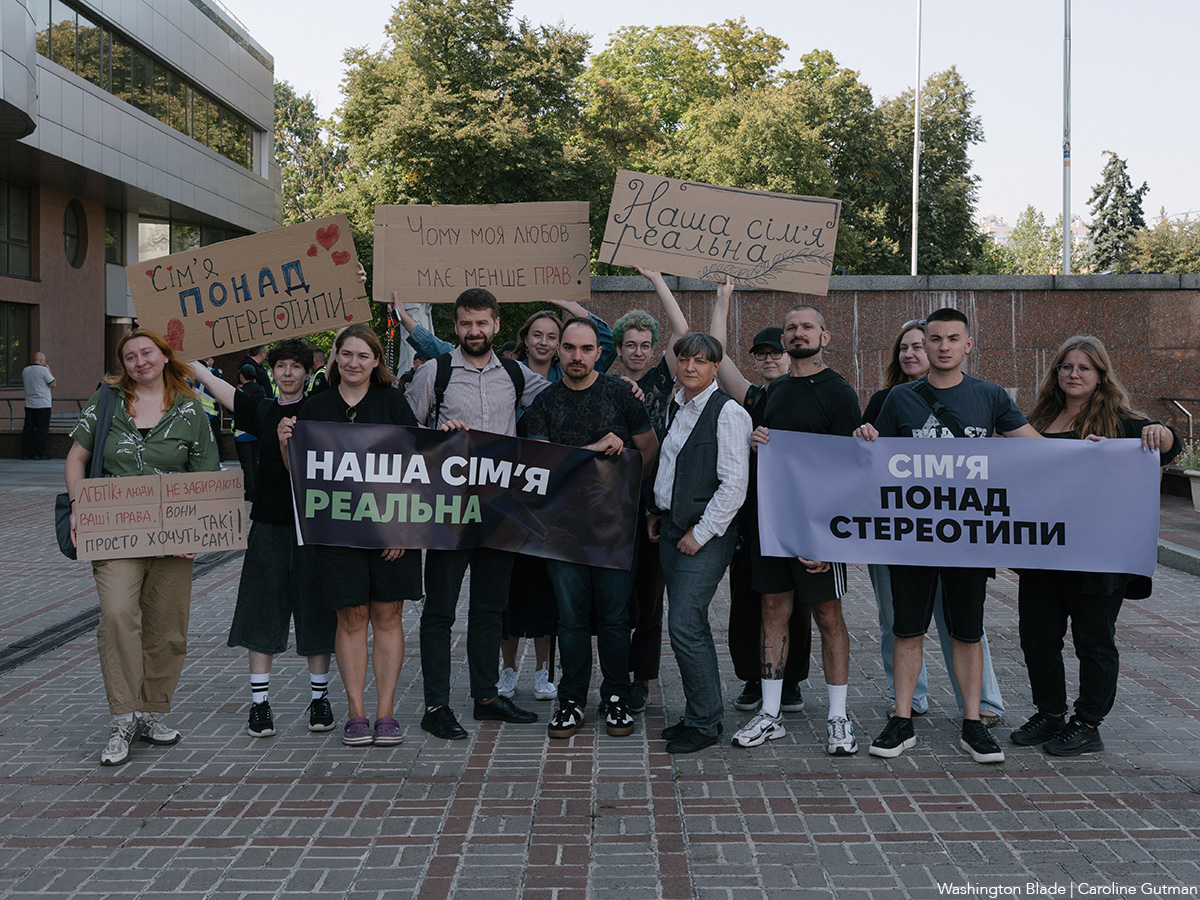
Ukraine
On the ground with Ukraine’s LGBTQ war heroes
Building a community amid attacks from inside and outside the country

(Editor’s note: The International Women’s Media Foundation’s Women on the Ground: Reporting from Ukraine’s Unseen Frontlines Initiative in partnership with the Howard G. Buffett Foundation funded this reporting. This report is exclusive to the Washington Blade.)
Ukraine’s LGBTQ war heroes have a chance to build a community and share their courage.
Despite Russian drones raining down on the capital, Kyiv’s gay military and veteran community gathers in a freshly redecorated safe space called “K-41.” The club has been a boiling pot this summer — Ukrainian, German, Dutch, and Portuguese DJs played music on warm September nights, guests gathered to dance, listen to lectures, or see a movie in the leafy garden outside.
One of the recent lectures was on “Practices for Non-Discrimination for LGBTQ people in the Workplace.” For many community members, the workplace is now the front, where they continue to fight and defend their country from Russian troops attacking Ukraine’s eastern, northern, and southern regions. And on rejoining the community for a break, veterans take up a different fight, for their human rights, against discrimination. Their fight does not stop on the front lines.
The number of LGBTQ heroes is growing; so is the number of fallen, sadly. There is a wall at the center covered in soldiers’ patches.
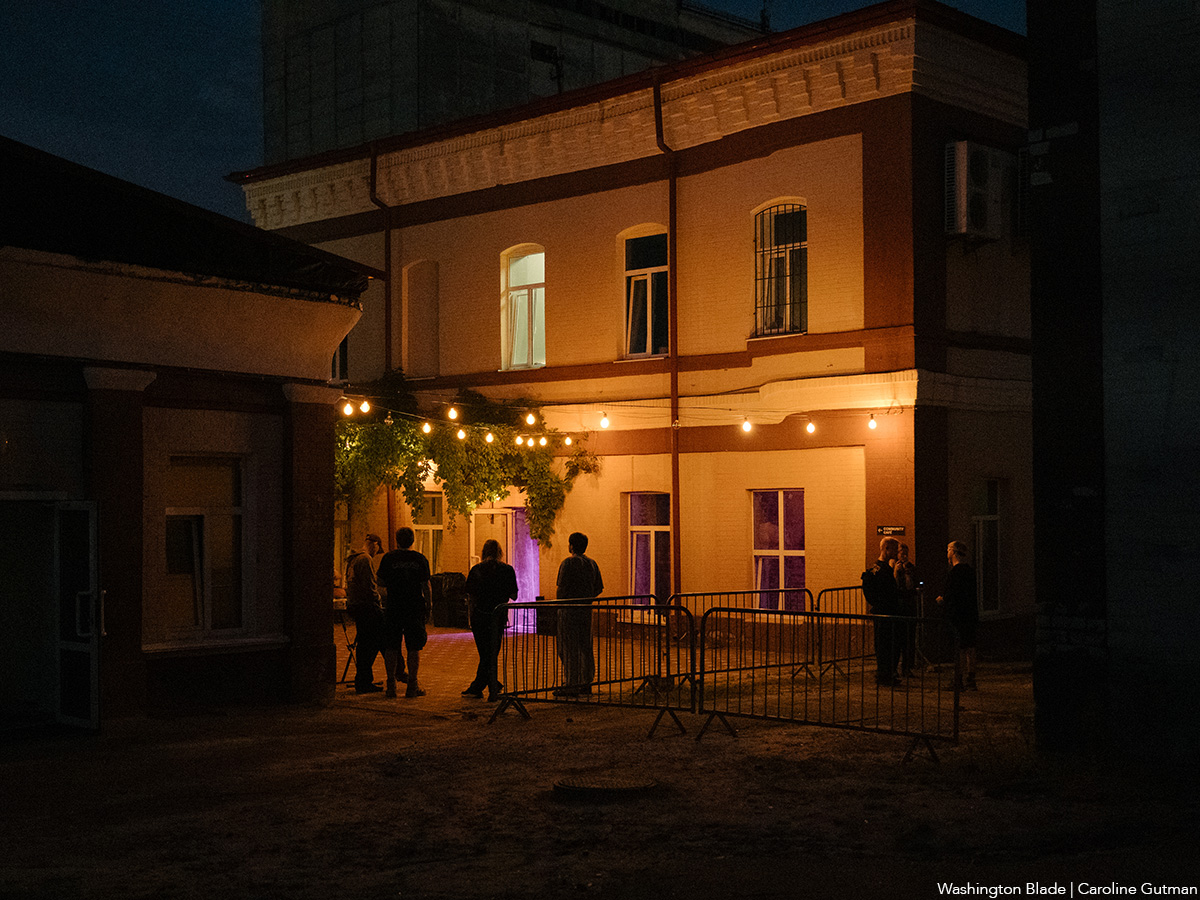
“Soldiers and veterans pop in and stick their insignias to this wall — we have welcomed more than 700 members into our LGBTQ veteran and military club,” one of the center’s founders, 38-year-old veteran, Victor Pylypenko, told the Washington Blade with pride. Openly gay, he volunteered and fought for his country from 2014-2016 and then again from 2022-2024.
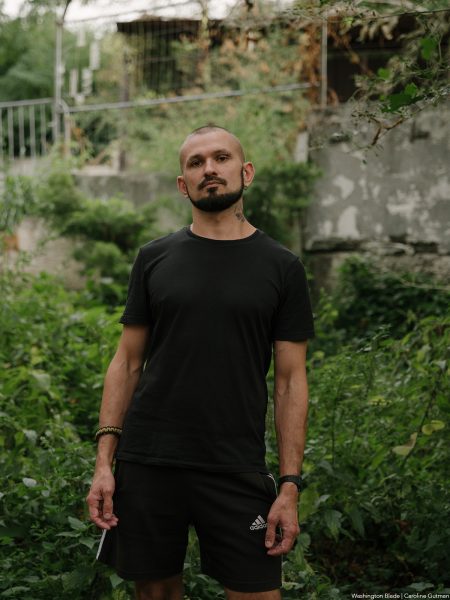
Giving us a tour of the club on a recent night, Pylypenko pointed out a portrait on the wall of another war hero, the newly elected leader of the “Ukrainian LGBT Military Personnel and Veterans for Equal Rights” NGO, Oleksandr Demenko. He is a survivor of the hellish battle for Mariupol and 20 months of horrific imprisonment in Russia.
“I always eat all the edges of the pizza, because I know that my brothers in arms do not have enough food or enough water in jail right now,” Demenko wrote, sharing his emotions recently with his Facebook readers.
A decorated officer, Demenko was among about 2,500 Ukrainian soldiers defending Azov Steel, a giant Soviet-era steel plant that was surrounded during the battle for the city of Mariupol from February to May, 2022.
Thanks to the British photographer Jesse Glazzard, who followed the lives of Ukrainian gay soldiers, Elton John helped Ukraine’s queer heroes.
“Elton John and his partner, David Furnish, bought a photograph by Glazzard in May and gave funds for our reconstruction of this center,” Pylypenko told the Blade. “We fixed the two rooms of the space nicely, bought furniture and the movie screen for our LGBTQ veterans — the biggest community for a military in Eastern Europe.”
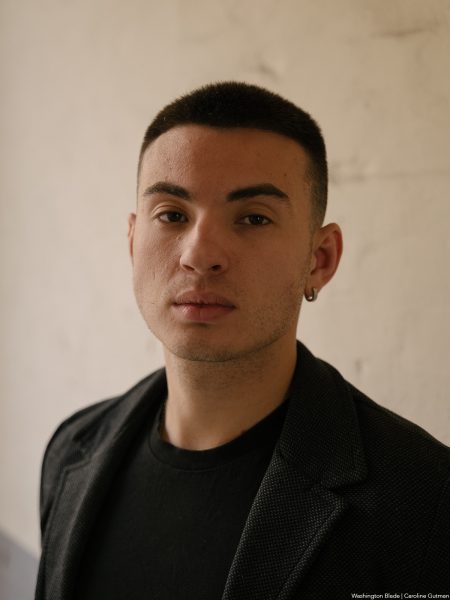
Demenko and his boyfriend recently became engaged, and the fight for the legalization of gay marriage became personal. Both Pylypenko and Demenko came to Kyiv’s Court of Appeals last month to support the first legal marriage.
“Every gay couple in our country hopes for President Zelensky to allow us to marry. This is our human right, along with every citizen,” the decorated veteran Demenko said in a recent interview.
To most members of this community, the war started in 2014 with Russia annexing the Crimean Peninsula. As many self-defense volunteers, Pylypenko, joined to defend his country in the Eastern regions of Ukraine. He served for nearly two years. There was too much homophobia at the time, so he stayed in the closet during his service. On coming home to Kyiv, Pylypenko tried to reconstruct his peaceful life, went to university and finished a master’s program in technical and scientific translation from English and French.
But the conflict with Russia did not stop; it escalated to Russia’s full-scale invasion early on the morning of Feb. 24, 2022. Pylypenko was visiting his parents in the town of Borodianka, a suburb north of Kyiv. Russian shelling blew up and burned buildings in Borodianka, killing hundreds of civilians.
Without thinking twice, Pylypenko volunteered to defend his country again, this time openly gay.
“At some point, I took out my cell phone with rainbow stickers from K-41 club; and my sergeant asked me if I was gay in front of everybody. I answered yes. The commander, who was only 22 years old, did not have any problems with that,” Pylypenko said.
During the battle for Kyiv, his platoon was defending the capital from the trenches on freezing cold days and nights, and saved lives of their wounded brothers in arms by evacuating them to hospitals. Pylypenko’s military experience was useful. And after Kyiv, he fought in the Sumy and Kharkiv regions. Some campaigns turned out “disastrous,” he said.
Last year, Pylypenko had to resign to take care of his father, who was “like a baby after a stroke.” The law allowed that. Shortly after his return from the front, the Ukrainian Orthodox Church honored him for “Courage and Love for Ukraine.”
“I thanked the church and Patriarch Filaret, previously famous for stating that gays had created COVID-19. I expressed my hopes that the priest would reject his homophobia; but immediately, the same day he cancelled his medal to me,” Pylypenko said. “Immediately, a flash mob began, soldiers who had previously received that same medal denounced it in solidarity with me. The soldiers’ brotherhood is great.”

The battle for survival during the war is tiring. The battle for human rights in the war-torn country is exhausting. The LGBTQ community is vibrant, active and well-organized in Ukraine. Its activists across the country fight for human rights, judicial reform and against corruption together with prominent civil liberties groups. Olena Shevchenko, 42-year-old leader of Insight, a group focusing on LGBTQ and feminist activism, says there is no time to live: “I have no life. I have a constant fight.”
The Insight community center is a cozy house in the hipster part of Kyiv’s old town, Podil. For nearly four years, Insight activists have been providing aid, legal support and shelter for their community, organizing art exhibits and taking part in anti-corruption and pro-democracy campaigns.
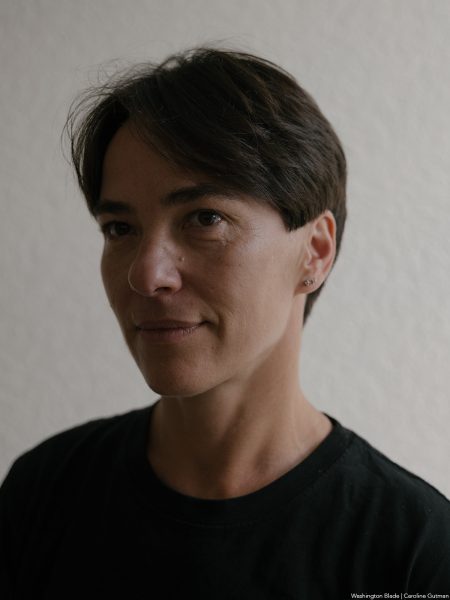
“Three days ago, homophobes attacked our center in Lviv and before that our center in Ivano-Frankivsk; some thugs stormed our exhibition in the city of Chernovtsy,” Shevchenko told the Blade. “They come again and again, break windows, spray walls with paint that imitates blood. Their goal is to block our events. They spray tear gas, terrify our activists.”
Shevchenko said that the attacks on the LGBTQ centers around the country are organized by far-right groups.
“One group is called Carpathian Sich, another Brotherhood, led by Dmytro Korchinsky and various new groups and networks frequently launched, like Tradition and Order,” she said. “We noticed that they received some amount of money about a year ago. They put around homophobic posters and aggressive stickers — we can tell that the money is coming to them. If before, money came from Russia, now they get funded from the U.S. as well.”
In spite of the attacks and risks, the community lives. Shevchenko, as many Ukrainians in the rear, saw her fight for human rights and against corruption as just as important as the fight on the frontline.
“If we don’t fight for democracy, who will do it? Our country would look bad if we stop. This is not just about LGBTQ, this is about freedom, democracy and the spirit that you can fight for something that is right,” she said. “Our government should be reminded about how good we are still at self-organization. We’ll be always here, this our own front. We have to keep track of democracy on all levels.”

Ukraine
Activists in Ukrainian city hold annual Pride event
Kharkiv is less than 30 miles from Russian border

Activists in the Ukrainian city of Kharkiv on Saturday held their annual Pride event.
A Kharkiv Pride press release notes 17 cars “drove through the city to draw attention to the importance of ensuring human rights for all through legislation.” Upwards of 50 people: LGBTQ people, activists, volunteers, and servicemembers, participated in the event lasted about an hour.
Kharkiv, which is Ukraine’s second-largest city, is less than 30 miles from the Russian border in the eastern part of the country.
Russia has repeatedly targeted the city since the Kremlin launched its war against Ukraine on Feb. 24, 2022.
Kharkiv Pride in its press release notes organizers decided to organize an “AutoPride” — “a motorcade format” — as opposed to a street march because of security concerns.
“Despite the fact that in Kyiv Pride has already taken place for two consecutive years in the format of a street march, the security risks in Kharkiv are higher, as the city is located in eastern Ukraine, close to the Russian border,” said Kharkiv Pride. “Therefore, for the second year in a row, the Kharkiv Pride team opted for a motorcade format — it allows them to convey important messages while taking security threats into account as much as possible.”
Kharkiv Pride noted police officers “escorted” the “AutoPride” participants.
“KharkivPride is a human rights civic movement, not just some kind of fun and entertainment,” said Anna Sharyhina, co-organizer of Kharkiv Pride and president of the Sphere Women’s Association. “Kharkiv needs Kharkiv Pride — a powerful and vivid distinction from Russia. We strive to live in a free and safe country and to have the same rights that heterosexual people already enjoy. Every day, LGBTQ+ people contribute to the victory, so the state must finally provide us with protection.”
